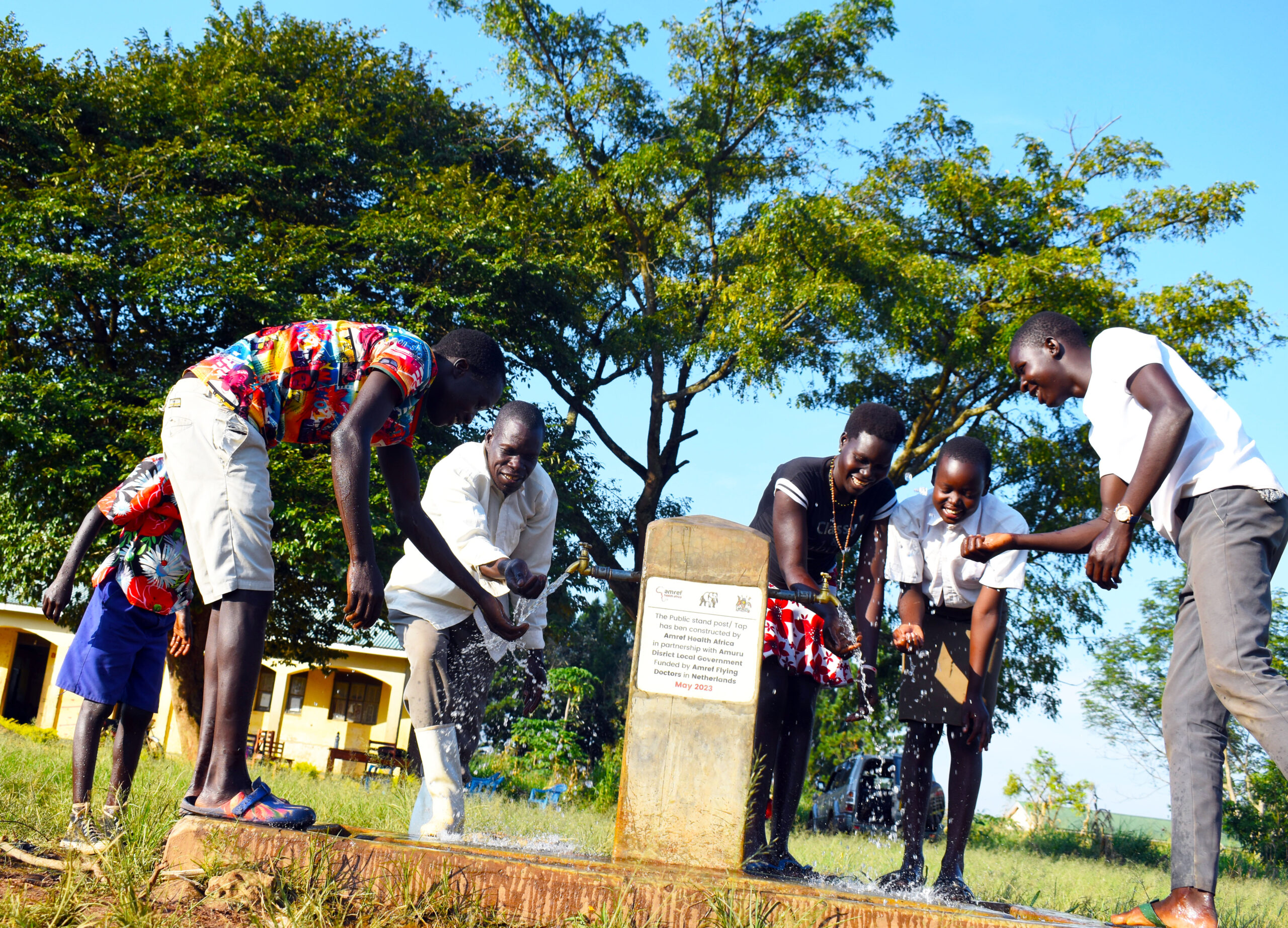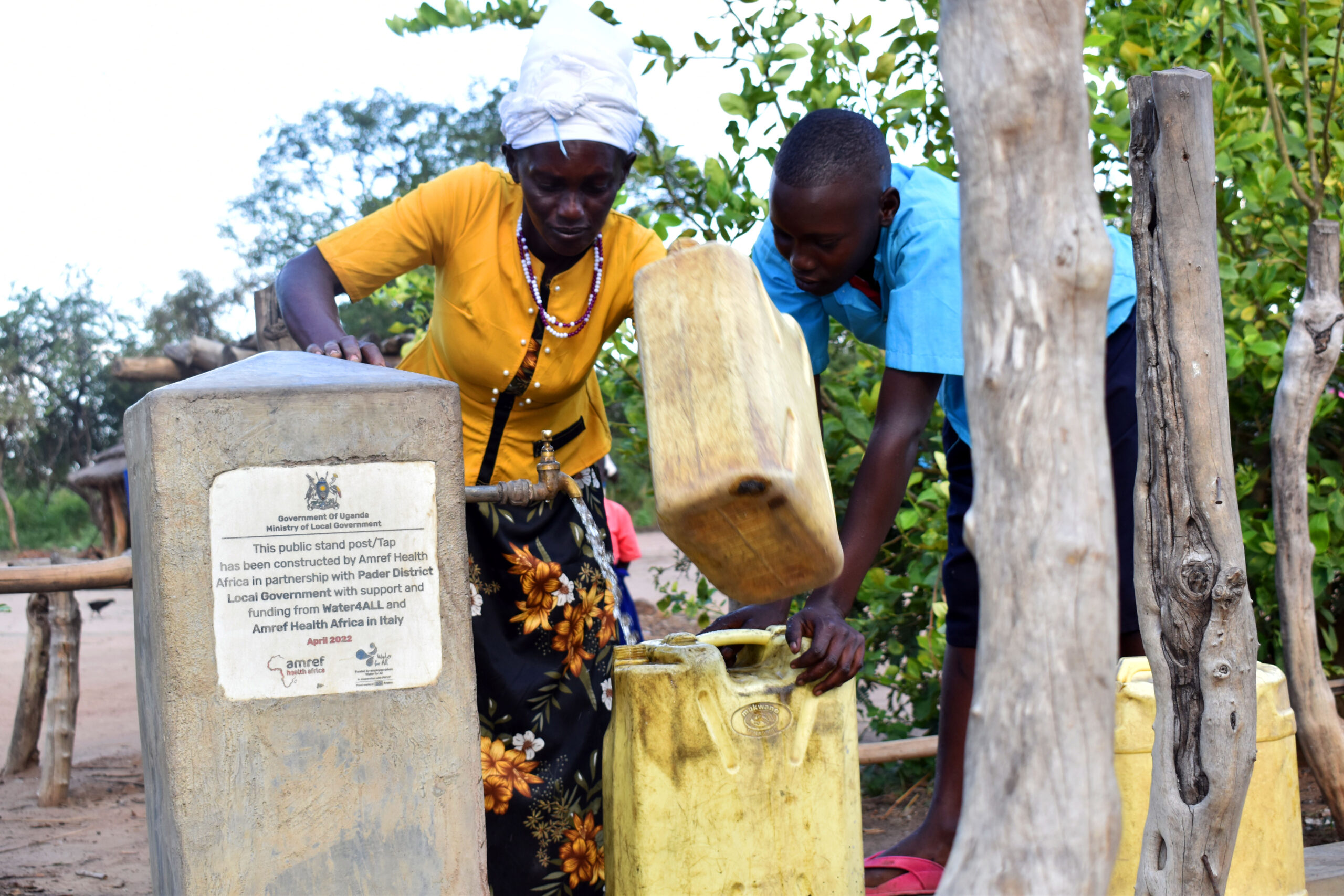Training and mentorship for midwives key in saving the next generation
Monday, 17 June, 2019

Namusisi Allen (NA) a 22 year old mother of two lives in a humble home in Katikamu village, Nyamarebe sub- county, in Ibanda District , She happily welcomes us into her home with a warm embrace of Harriet the midwife who delivered her second child who is three months old now and in good health. She expresses a lot of joy as She greets in praise “This midwife saved my life, Midwife! how should I thank you?”
Allen delivered at Nyamarebe HC lll which is 11KM away from her home three months ago. She went to the health center when she developed labor pains to deliver under the care of the midwives who had attended to her during her two Antenatal visits. She narrates that she wanted to deliver from a health facility because for her first pregnancy she had delivered at home under the care of her mother but then the placenta failed to come out and she had to be referred to Mbarara Regional Referral hospital were she was treated.
At the health center, she delivered her second child – a bouncing baby girl and the couple was filled with joy. This joy was brought to a standstill when Allen developed post-partum hemorrhage (PPH) which is the excessive(life-threatening) bleeding after delivery Harriet attended to her and Managed the PPH, the bleeding was controlled (stopped) but She was by then severely anemic having lost a lot of blood and in dare need of a lifesaving blood transfusion. Nyamarebe HC III is 45 Km from Ibanda Hospital the nearest facility with blood transfusion services and the situation is made worse by the fact that there is no ready public transport from this remote location to Ibanda town, it often takes more than 4 hours to arrange for a vehicle to transport a patient from this facility. However Allen was Lucky Harriet called an ambulance from Ibanda hospital and she was transported to Ibanda hospital for the needed blood transfusion that saved her Life, she is now able to look after her 3 months old baby and the firstborn who is 2 years , her husband is also lucky to have a caring wife and Mother for his children.
Allen was lucky, transport was arranged for her to Ibanda hospital In time to receive the necessary treatment , KM a 24 year old mother died at the same health facility in the 24th week of her second pregnancy a month earlier , She was brought to the health center in a critical condition, She had Severe malaria with Severe Anemia, She had been sick at home for more than 3 days , she urgently needed an emergency blood transfusion but died 4 hours after arriving at the health unit while the relatives were still collecting money and waiting for a taxi from the village to come and transport her to Ibanda hospital. This death could have been prevented had transport been quickly arranged for KM.
Maternal mortality remains a monster that is robbing the life of mothers at the prime of their lives , robbing children of their mother, husbands of their wives! Brothers of their sisters, parents of their daughters and the nation of its pillers, in Uganda 336 mothers die in the struggle to give life for every 100,000 live births , what is more distressing is that majority of these deaths are preventable!, preventable only if we learn from each death, and act to address gaps that led to the deaths so that no other mother dies from the same cause.
The MOH working together with USAID RHITES SW has supported the implementation of Maternal and Perinatal death surveillance and review(MPDSR), an improvement process that focuses on reviewing the circumstances surrounding each maternal and Perinatal death , identifying Gaps that should be addressed to prevent similar deaths from the same gaps. Through this exercise MPDSR trainings were conducted in the 16 district supported by USAID RHITES, and this was followed by Mentorships to support establishment of facility MPDSR committees.
Nyamarebe HC III is one of the health facilities were health workers were trained , and mentorship done which enabled the formation of an MPDSR committee at the facility, When KM died at the facility , a review was conducted by the health workers at Nyamarebe HC III , that identified a number of gaps that contributed to KM’s Death, and action points were developed. One of the gaps identified was the lack of transport means to promptly transport KM to the hospital for the transfusion, the health workers were informed that Ibanda hospital had an Ambulance system that can enable the Quick transport of patients for treatment and the patient meets the transport costs at discharge from the hospital, But the health workers did not Know the contact number of the Ambulance operator, as an action the in charge of the facility contacted the hospital and obtained the number which was pinned on the ward, this arrangement is now included in client education in ANC to all mothers for emergency preparedness. By having this contact the health facility would now be in position to call for the ambulance and have patients transported quickly there by preventing a similar case like KM’s happening again at this facility, and when Allen needed emergency transport it was arranged quickly which saved her life!, postpartum hemorrhage and severe anemia did not rob Allen’s life this time.
The world health organization has identified the three delays that contribute to maternal and perinatal deaths, these are : Delay to seek care , delay to reach the health facility and delay to receive appropriate intervention once the patient has reached the health facility, actions aimed at minimizing these days would go a long way in reducing maternal deaths.
Maternal deaths occur due to systems and process gaps, some of these gaps are as small as a drug locked in a cupboard or having no contact for emergency transport, but can as well be as complex as Liver or Renal failure in preeclampsia, many of these gaps can be addressed only if Health teams and all stakeholders review the circumstances of each and every maternal and perinatal death , identify rectifiable factors and act to address them, such that another life is not lost to the same avoidable cause.
At Ibanda Hospital the Hospital Administrator Kobwesigye Stella explains that “ The Hospital realized that many mothers are lost in the community and at lower level facilities due to lack of transport , through our MPDSR review and with support from our hospital friends from German, the hospital now operates a community ambulance scheme, were if health worker or community members calls us, a team is dispatched to go and collect the patient , for treatment , the patient is then required to reimburse the cost of fuel, we have been able to save many lives through this arrangement.” Ongom Philip the Ambulance driver explains that each month they provide emergency transport to about 20 mothers with complications.
Allen was thankful to Harriet and the health team at Ibanda hospital, in her own words “ the midwife treated me , but I think I had lost a lot of blood, my husband did not have money but she called the ambulance which came quickly, I collapsed and woke up in Ibanda Hospital being transfused, we later found money to pay for the transport, but above all my life was saved, for that am very grateful and thankful”
Harriet is grateful for the support she and the facility have received from USAID RHITES-SW “ initially we never wanted to even talk about maternal deaths , it was about being arrested and embarrassed, but USAID RHITES-SW trained us, the only way to prevent avoidable maternal deaths was by learning from each death, identifying the gaps and addressing them, some of these gaps are small yet they make the difference, after I had managed Allen she was severely anemic and needed transfusion, because of the gaps we had identified we now had the contact of the ambulance at Ibanda hospital and when I called they responded promptly, I think this saved her life , just having the number to call!”
Using the MPDSR process as a learning and improvement agenda we shall be able to learn from each deaths and prevent future similar deaths and one by one we shall be able to save more mothers and Ultimately bring the MMR in Uganda to a single digit figure, Such interventions aimed at reducing the three delays like the Community ambulance scheme operated by Ibanda Hospital should be emulated and replicated in many communities as well as raising awareness and creating demand for maternal health services.
Author (Dr Mulindwa Alex)
Dr. Mulindwa Alex is a medical doctor working with AMREF health Africa in Uganda as a program officer for Reproductive, maternal and child health under the USAID Regional health integration to enhance services in South Western Uganda (RHITES-SW) project. In this position Dr. Alex is offering technical support to the districts health departments in southwestern Uganda to address reproductive, maternal and child health challenges.
Amref Health Africa teams up with African communities to create lasting health change.




